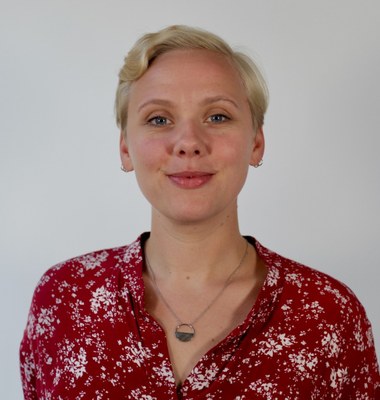Profile of Jóhanna Bjarnadóttir
It’s mid-winter and a protest is making its way down the street, having already marched for hours. The buildings on either side of the street form a wind tunnel, scattering flyers and causing protesters to lose their signs and flags. More than a few people decide to call it quits. It’s hard not to ask yourself at that point, will it really have an impact if I steel myself against the cold and keep marching?
This is precisely the question that Jóhanna Bjarnadottir is pursuing in her research. Bjarnadottir is a doctoral researcher in the RTG Dynamics research group at Humboldt-Universität zu Berlin and the Hertie School, where she researches questions related to street protests, political parties, and voting behvavior. She wants to find out how responsive political parties are to protests and what that says about the health of a democracy.
Bjarnadottir grew up in Iceland and moved to Berlin at 20 to study at HU Berlin, where she earned a BA and MA in social sciences, specializing in political science. Throughout secondary school and her undergraduate studies, she thoroughly enjoyed studying and learning new things. This sense of curiosity led her to pursue a PhD after her BA and MA. “I wasn’t quite ready to stop studying,” she says. She joined the RTG Dynamics in 2020.
Now, two years into her PhD, she still feels excited by her research and by the prospect of uncovering something new. Particularly rewarding is the research process itself — zeroing in on a question, reading a lot about one topic, grappling with data, and at the end of the day (or month) having a concrete result that she produced. “I still find it inherently interesting, even after three years of thinking about nothing else.”
But what makes her work exciting can also make it challenging. “In a PhD, you’re often trying to answer things which have not been answered before. I can’t expect anybody really to have all the answers that I need.” Indeed, her research area is one that until recently was rather neglected in political science. “I thought, this cannot be,” she says. “Parties are the main representative channels in democracy, and protests are such a legitimate form of political participation, but this link just wasn’t there.”
And so she set out to fill this gap in the research, with her dissertation on the responsiveness of political parties to street protests in Germany. The first study in the dissertation focuses on parties’ responses to environmental and far-right protests and how the appearance of new parties in parliament affects the responses of established parties. For example, the Green Party is ideologically linked to environmental protests. Once they enter parliament, they pose an electoral threat to other parties, who stand to lose voters to them. So does this make those established parties more responsive to environmental protests?
Inherent in these considerations is the assumption that parties respond to protests because of electoral concerns — they’re worried that protesters might be voters or might persuade other voters and think that by addressing the issues being protested they can win voters. But, Bjarnadottir noticed, this assumption hasn’t really been tested. So in her next study, she’s testing whether responsiveness to protests actually does affect voting behavior.
Ultimately, she’s driven by a desire to provide information that can shape political participation and speak to the quality of our democracy. Especially if it turns out that street mobilization doesn’t influence what happens in parliament. “Then there’s a missing link in the democratic chain,” she notes. “A vibrant civil society is a mark of a healthy democracy. But if that civil society doesn’t have any effect, that adds a question mark to the health of that democracy.” She sees her role as creating awareness of those kinds of gaps.
After her PhD, she hopes to continue this work, whether in academia or as a researcher at an NGO. Which title she ends up with isn’t of great concern to her — what’s important is that she can make an impact and continue to pursue the questions she finds interesting. “You never finish learning. I’m happy with what I’ve learned during my PhD. But there’s so much that I don’t know. It just opens up more doors with more questions.”
written by Nad Porter-Kasbati

